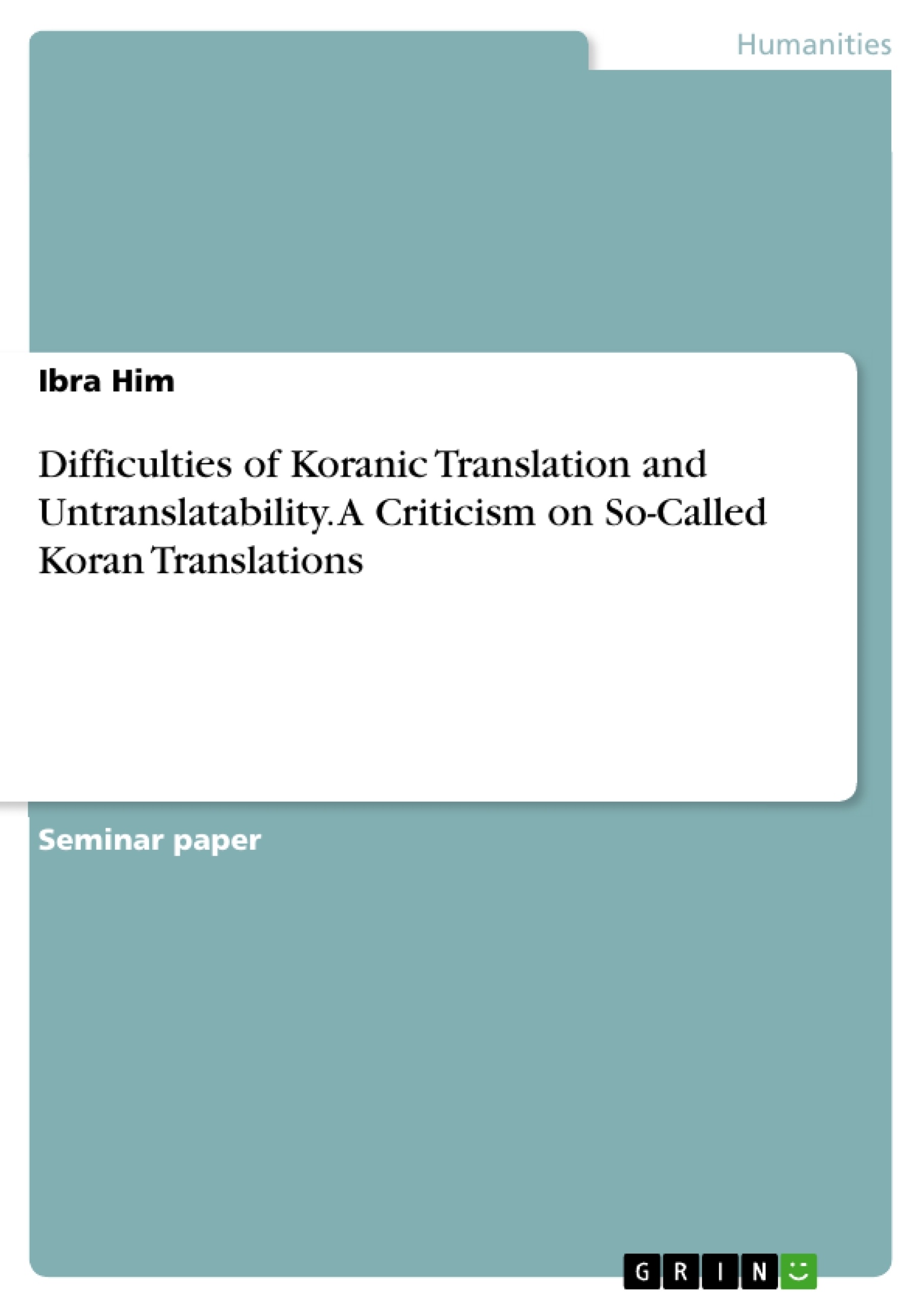The aim of this term paper is to provide evidence that the Koran is untranslatable and how incorrectly translated verses are abused by sects to manipulate their audience and to gain more members. The paper concentrates only on the linguistic level and not on the political effects of incorrect translations.
The idea of untranslatability and reasons why Islamic scholars think that the Koran is untranslatable are presented. In relation to that, the paper also refers to the Sapir-Whorf hypothesis. In the second part, some incorrectly translated verses sby some guidelines based on Gerzymisch-Arbogast’s "Übersetzungswissenschaftliches Propädeutikum" are criticised.
Inhaltsverzeichnis (Table of Contents)
- DIFFICULTIES OF KORANIC TRANSLATION AND UNTRANSLATABILITY
- THE UNTRANSLATABILITY OF ASSONANCE
- THE UNTRANSLATABILITY OF INTENTION
Zielsetzung und Themenschwerpunkte (Objectives and Key Themes)
The primary objective of this term paper is to provide evidence for the untranslatability of the Koran and to showcase how incorrectly translated verses can be exploited by sects to manipulate their audiences and gain more members. The paper will focus solely on the linguistic level and not on the political effects of inaccurate translations. The paper will explore the Sapir-Whorf hypothesis and analyze the translation of specific verses through the lens of Gerzymisch-Arbogast's translation science.
- The untranslatability of the Koran
- The impact of linguistic features on translation accuracy
- The potential for manipulation through incorrect translations
- The importance of stylistic devices and meaning in translation
- The Sapir-Whorf hypothesis and its relevance to Koran translation
Zusammenfassung der Kapitel (Chapter Summaries)
- The chapter "DIFFICULTIES OF KORANIC TRANSLATION AND UNTRANSLATABILITY" delves into the historical context of translation within Islamic tradition, emphasizing the unique position of the Koran as a divinely revealed text in Arabic. It explores the reasons why Muslims consider Arabic to be the most sacred language and why translating the Koran is deemed unacceptable. The chapter also touches on the challenges of translating the Koran's stylistic devices, which are deeply embedded in the Arabic language.
- The chapter "THE UNTRANSLATABILITY OF ASSONANCE" focuses on the limitations of translating assonance, a key stylistic device in the Koran. It uses a specific verse to illustrate how the loss of assonance in translation can result in the loss of important meaning.
- The chapter "THE UNTRANSLATABILITY OF INTENTION" delves into the challenges of translating the intended meaning of a verse beyond its literal translation. The chapter uses a verse from the Koran to demonstrate how the intonation and punctuation in the Arabic text can convey meaning that is easily lost in a literal translation.
Schlüsselwörter (Keywords)
The paper's key terms and focus areas include Koran translation, untranslatability, stylistic devices, assonance, intention, linguistic features, Sapir-Whorf hypothesis, translation science, manipulation, and sects.
Frequently Asked Questions
Is the Koran considered translatable in Islamic tradition?
Many Islamic scholars consider the Koran untranslatable because its divine nature is tied to the specific Arabic language in which it was revealed.
What is the Sapir-Whorf hypothesis?
It is a theory suggesting that the structure of a language affects its speakers' world view or cognition, which is relevant to the challenges of translating sacred texts.
Why is assonance important in the Koran?
Assonance is a key stylistic device that carries meaning and rhythm; losing it in translation can lead to a loss of the text's depth and impact.
How can incorrect translations be misused?
Sects or political groups may use inaccurate translations to manipulate audiences, change meanings, or recruit new members.
What linguistic levels are focused on in this paper?
The paper focuses purely on the linguistic and stylistic levels of translation rather than political or social effects.
- Quote paper
- Ibra Him (Author), 2015, Difficulties of Koranic Translation and Untranslatability. A Criticism on So-Called Koran Translations, Munich, GRIN Verlag, https://www.grin.com/document/371235



